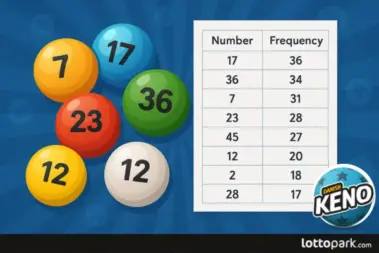
Many lottery players believe that certain numbers are “luckier” than others. Some pick the same numbers week after week, while others rely on random generators or patterns. But is there any mathematical truth to the idea that some numbers are drawn more often than others? Or are players just seeing patterns where none exist?
In this article, we dive into the statistics behind lottery numbers, explore the concept of “hot” and “cold” numbers, and explain why most common lottery strategies are based on myths.
Do Some Numbers Really Get Drawn More Frequently?
Statistically speaking, in a perfectly random system, all numbers should have an equal chance of being drawn in each game. However, real-life lotteries are subject to slight mechanical biases, data anomalies, or variations that can result in some numbers appearing more often over time.
For example, in lotteries that have been running for decades, data analysis often reveals small but measurable discrepancies in the frequency of certain numbers.
Let’s take a quick look at example frequency data to see this in action:
Most Frequently Drawn Numbers in a Hypothetical 1–50 Lottery
| Number | Times Drawn (out of 1,000 draws) |
|---|---|
| 17 | 142 |
| 36 | 139 |
| 7 | 137 |
| 23 | 134 |
| 45 | 133 |
| 12 | 92 |
| 2 | 90 |
| 28 | 89 |
As you can see, while most numbers hover around 100 appearances, a few exceed 130 or fall below 90. Statistically, this is expected in random distributions with many trials. It doesn’t necessarily imply that those numbers are “due” or “lucky” – it’s just normal variance.
What Are “Hot” and “Cold” Numbers?
The terms “hot” and “cold” numbers are popular in lottery communities. Here’s what they typically mean:
- Hot numbers: Digits that have been drawn more frequently than average in recent draws.
- Cold numbers: Digits that have appeared less frequently or not at all over a period of time.
Players often use this classification to guide their number choices. Some believe in “riding the streak” of hot numbers, while others look to cold numbers under the belief that they are “overdue” to be drawn.
While this idea is attractive, it’s based on a misunderstanding of probability. In a fair lottery, each draw is independent. A number that hasn’t shown up in months is no more or less likely to appear in the next draw.
Why Do Players Believe in Lucky Numbers?
The idea of lucky or unlucky numbers is rooted in human psychology, not mathematics. Our brains are wired to search for patterns, even in random data. This phenomenon, known as apophenia, makes us more likely to spot sequences or assign meaning to coincidental results.
Examples include:
- Choosing birthdays (which skews numbers toward 1–31)
- Avoiding “unlucky” numbers like 13
- Repeating past winning combinations
- Favoring symmetrical or “pretty” number patterns
Lotteries feed into these behaviors, offering players the illusion of control. But in truth, random number draws do not “remember” the past, and no pattern can change your odds.
Still, if choosing your mother’s birthday makes the experience more fun – go for it. Just don’t expect it to boost your chances.
Can Statistical Analysis Help You Win?
While you can analyze historical frequency data, it will not guarantee better odds. Lotteries are carefully regulated and tested for randomness. Any number from the pool has the same probability of being drawn every time.
That said, some players enjoy studying frequency charts as a way to feel more engaged. If that sounds like you, you might:
- Play Hungarian Keno online and track your own results.
- Check Swedish Keno results online for recent winning trends.
- Explore jackpot info Danish Keno to see how draws vary over time.
Just remember – these tools are for fun and observation, not prediction.
Are There Any Number-Picking Strategies That Actually Work?
Unfortunately, no number-picking method will give you an edge in a fair lottery. However, some strategies can help optimize your experience:
Useful Lottery Number-Picking Tips:
- Avoid common combinations: Like 1-2-3-4-5-6 or multiples of the same number. If you win, you’ll likely share the prize with many others.
- Don’t stick to birthdays only: You’ll limit your range to numbers under 31.
- Use full range coverage: Mix high and low numbers.
- Try random generators: These ensure unpredictability.
- Stay consistent if you enjoy routine: But change it up if you’re not having fun.
These don’t increase your chances, but they might increase your odds of keeping the full jackpot if you ever hit it.
What Are the Biggest Myths About Lottery Numbers?
There are several popular myths that many players believe. Let’s debunk a few:
- Myth 1: “Cold numbers are due to win soon.”
- Truth: Every draw is independent. There’s no memory in randomness.
- Myth 2: “Repeating past winning combinations increases your chances.”
- Truth: Previous winning combos have the same odds as any other.
- Myth 3: “Avoid numbers that haven’t won in years.”
- Truth: They are just as likely to win as any other numbers.
- Myth 4: “Certain games have predictable patterns.”
- Truth: Legitimate lottery systems use certified random number generators or mechanical draws, making patterns impossible to exploit.
Are Some Lotteries More Random Than Others?
Lotteries that use digital RNG (random number generators) are generally considered more consistent than mechanical ball draws, which can develop wear and tear over time. However, both methods are tested and audited.
If you’re curious, you can click and play Danish Keno to experience a modern, digitally operated game format.
Some platforms, like LottoPark, also allow cryptocurrency payments, which can appeal to tech-savvy players seeking privacy and speed.
Final Thoughts: Should You Trust the Numbers?
The idea that some numbers win more often may be partly true over a long enough timeline – but in the short term, lottery outcomes are pure chance. While statistical quirks exist, they don’t offer a formula for success.
If you love lotteries, embrace the randomness. Choose numbers that feel meaningful, try new combinations, or let the system pick for you. Just remember:
- The best strategy is moderation.
- The best tool is awareness.
- The best reward is the fun of the game.
READ ALSO: The Psychology of Lottery Spending: Why 70% of Winners Lose It All Within 5 Years




